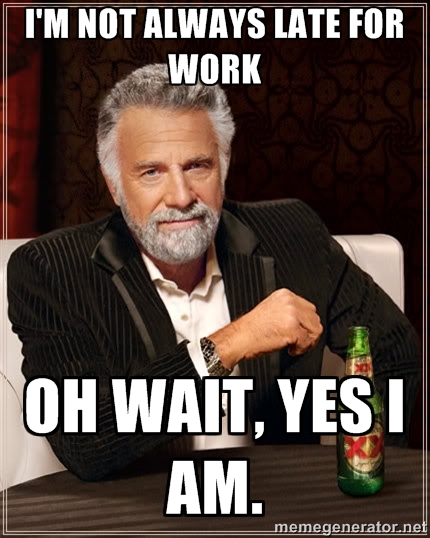This week’s post is a guest article by Dillon Forrest, Product Manager & Growth Hacker
Daria the Developer shows up to work at 8:55am, a bit early for her daily standup at 9am. Most of her coworkers roll into the office in the next few minutes. Nobody’s gotten their coffee yet.
At 9am on the dot, the project manager power walks through Daria’s section of the bullpen and says, “Standup time, good morning everybody, let’s go everybody, come on everybody, standup time, let’s go! Starting at 9am sharp!”
There are 12 people on the calendar invite for this team: 5 developers, 1 designer, 1 product manager, 2 QA managers, 1 project manager, the VP of Engineering, and the CTO.
The VP Eng and CTO aren’t present, but that’s normal. They never show up for daily standup. They haven’t attended a daily standup since Daria joined the company. They are both adamant about everybody showing up at 9am sharp for standup, but they themselves might roll into the office around 10:30.

Two developers and a QA manager are late. The seven present team members stand in a circle in the center of the bullpen, and the project manager insists on starting the daily standup without the absent coworkers. The project manager is quite impressive at following orders from the higher-ups when it comes to starting meetings on time.
The two tardy developers roll into the office at 9:05am, and sadly they’ve missed the daily update from three people already. Tardy Developer #1 hasn’t taken off his jacket or bag yet, but the project manager jumps at the chance to suggest that Tardy Developer #1 give his update.
Tardy Developer #1 is unprepared. His update is incoherent, he cuts it off short, but he does a good job of hiding his discomfort. The project manager looks a little vindicated. Daria always knew that the project manager was the type to passive-aggressively penalize people for being late to standup, so she makes sure she’s always a few minutes early.
Tardy Developer #2 is way better at the office metagame than Tardy Developer #1. Tardy Developer #2 slithers to the opposite end of the circle, knowing that three or four more people will give their update before it circles to his turn, giving him plenty of time to not only prepare an update of his own, but also take off his jacket and bag and hide them from sight, as if he was present all along. His update is way lengthier and composed. The project manager is obviously happier with the update from Tardy Developer #2 than the update from Tardy Developer #1.
Daria regularly asks Tardy Developer #2 for career advice.
Standup lasts until 9:20am, extending beyond its 10-minute slot on the calendar. By this time, Tardy QA Manager rolls in. He’s too late to catch anybody else’s update, but he drops a 10-second update with confidence, like a champ.
Tardy QA Manager has a 90-minute commute in the morning. Traffic and weather frequently delay his commute, forcing him to miss standup altogether at least once a week. However, he’s strangely talented at estimating the cost of his work each sprint, which the project manager cherishes to death, so the project manager doesn’t mind him missing daily standup regularly. He’s also the funniest person during the team’s cigarette breaks, so the rest of the team doesn’t mind his immunity to the project manager’s passive-aggressiveness.
At 9:20am, when the project manager gives everybody permission to leave, everybody stops pretending to pay attention, and they go seek out their coffee.
Daria’s standup is not uncommon
Some standups are better, some are worse. But developers like Daria hate standup for several reasons.
Standup is a meeting, and meetings suck
Most developers don’t need a meeting to do their work. They need time to themselves to write code.
However, most non-developers need meetings with developers so they can ask the developers questions, get engineering cost estimates, and get timelines for feature completion.
“How long would it take to do X? Isn’t it just an easy fix to do Y? When do you expect to finish Z?”
To a developer, a meeting signals that others will subtract value from them. Developers rarely receive value from these meetings. It’s just time taken away from their work to help other people.
Helping people is totally cool (believe it or not, most developers think it feels good to help others), but being expected to churn out a ton of new code while attending 5 hours of meetings every day is not realistic. Those situations gave birth to Dilbert comics.
Standup is a meeting, and meetings suck.
Writing is usually better than speaking, but standups are all speaking
Writing is not always preferable to speaking, but it usually is for developers.
Computers are great at remembering things. Humans are not. When you write, you ask a computer to remember everything you say. Anything that anybody tells you is just one Gmail or Slack query away. Your memory just grew by a million times when you moved from speaking to writing, no exaggeration.
Writing means you can include links. You’re working with developers, which means you’re probably building software, which means you’ll need to reference plenty of links. Writing also means you can share images and charts, but links are the real deal that you want to be sharable. You can’t hyperlink spoken words.
Writing also forces you to think. In a meeting, anybody can blurt out while being completely unprepared to speak, and everybody else is bound by social norms to wait patiently for them to finish. Writing forces you to slow down, because muddled written thoughts are penalized by earning zero replies. Writing forces you to be accurate and precise.
Lastly, writing is asynchronous. You get to it when you have time, leaving you with more command over your schedule. Unless the situation calls for high-throughput back-and-forth, asynchronous communication is vastly more productive than synchronous.
Writing is usually better than speaking, but standups are all speaking.
Daily standup doesn’t even work
There are a few standard arguments in favor of daily standup, but they’re all myths.
Myth: Standup enables reporting to managers. Standup forces everybody to show their output to their managers. This usually doesn’t work effectively. Managers usually don’t understand everybody’s updates since speaking is the suboptimal communication medium. They usually only get a fraction of the whole story. So yes, standup enables some type of reporting to managers, but it’s not accurate or meaningful reporting. It’s just noise to sedate the desire for process.
Myth: Standup enables transparency and communication across teams. I’m highly skeptical that people even pay attention to their coworkers during standup. And again, everybody is speaking, not writing.
Myth: Standup uncovers blockers. This is actually true, that standup is a reliable channel to discuss your blockers with your team and figure out how to get unblocked. The problem is the opportunity cost. Standup is an expensive use of everybody’s time. When you have a blocker, do you need to broadcast it to everybody on your team? Of course not, you can just go to the one person who you know can help. So I reluctantly admit that standup can uncover blockers, but I’d argue that standup is a very costly way to do it.
The one claimed benefit which is actually true is that standup forces your team into the office early in the morning. It feels paternalistic to have these processes to get people to arrive to work by some deadline, but standup is highly effective at doing it. If it weren’t for standup, Tardy Developer #1 and Tardy Developer #2 would probably arrive at 9:30 or 10am instead of 9:05am.
The only real benefit of standups, forcing everybody into the office early in the morning, generates no intrinsic value for the company. The other claimed benefits are invalid. Standup is arguably worthless to the company.
The cost of daily standup
Okay, so standup creates no value. But how much does it cost the team?
Let’s say that the average employee in your standup costs $200,000 per year, including salary, benefits, etc. With 50 work weeks in the year and 40 hours per week, that’s $100 per hour per employee.
Some standups are small, with only 5 people. Some are large, with 20 people. Let’s pick 10 as the median, just like Daria’s standup. If 10 people waste time for an hour, that costs the firm $1,000. If standup is a waste of time, and if it lasts 15 minutes, then it costs $250 per standup.
But standup happens every day. If there are 4 work weeks per month and 5 business days per work week, then standup costs $5,000 per month.
You’ll need to sign-off on a receipt to expense $50, but you can call a 15-minute useless meeting with 10 people every single day, and nobody notices.
How do we fight the standup epidemic?
The issue with standup is that it emphasizes process over results.
There are plenty of tools out there, including iDoneThis, which embody what developers love. They’re asynchronous. They promote writing over speaking. Most importantly, they eliminate process and promote results.
Thankfully, many of these same tools also embody everything that managers love. They promote communication, transparency, and reporting.
These tools are a radical deviation from the TPS reports, the Dilbert punchlines which cut too close to home, and the meetings to discuss meetings in preparation for more meetings to plan meetings to discuss why we’re behind.
Daily standup is a silent epidemic. Let’s recognize its cost, get the right tools to fight it, and focus on results instead.
P.S. If you liked this article, you should subscribe to our newsletter. We’ll email you a daily blog post with actionable and unconventional advice on how to work better.


